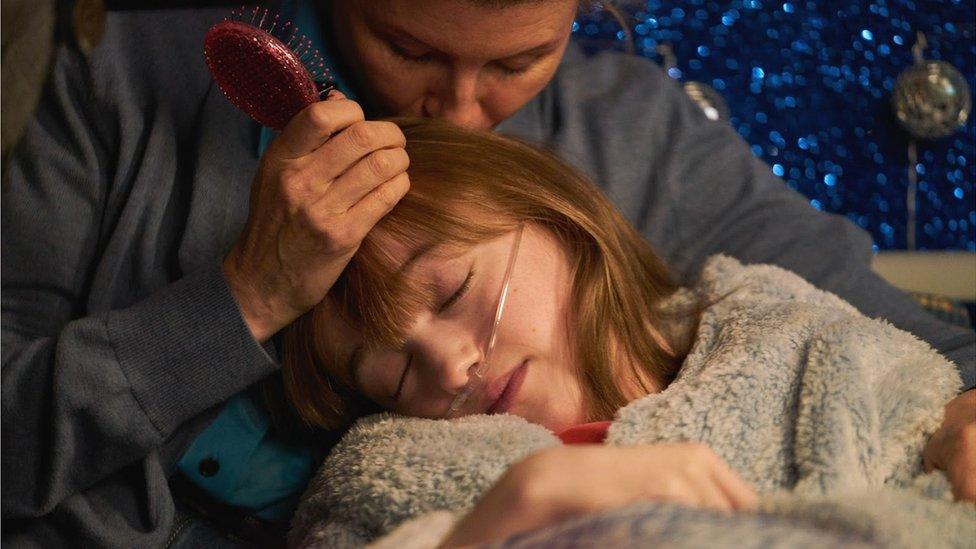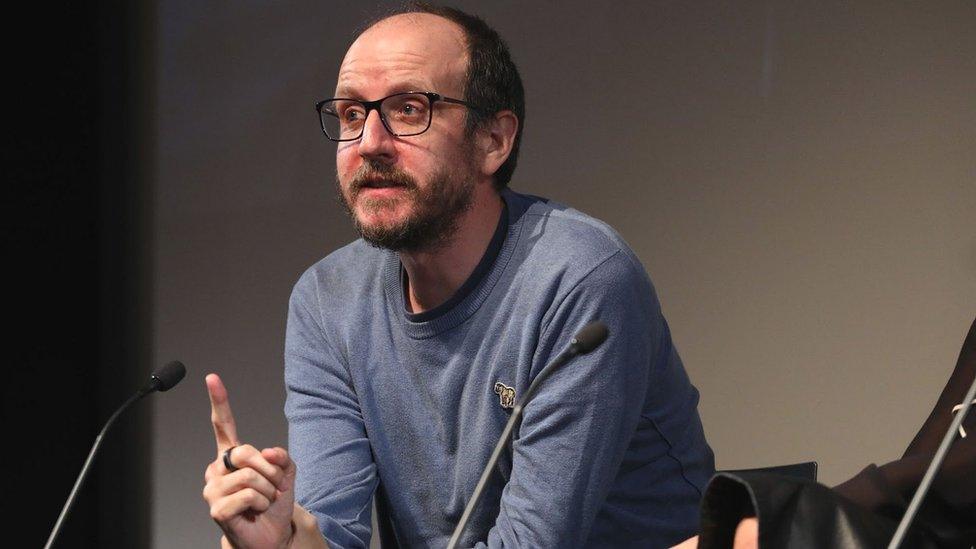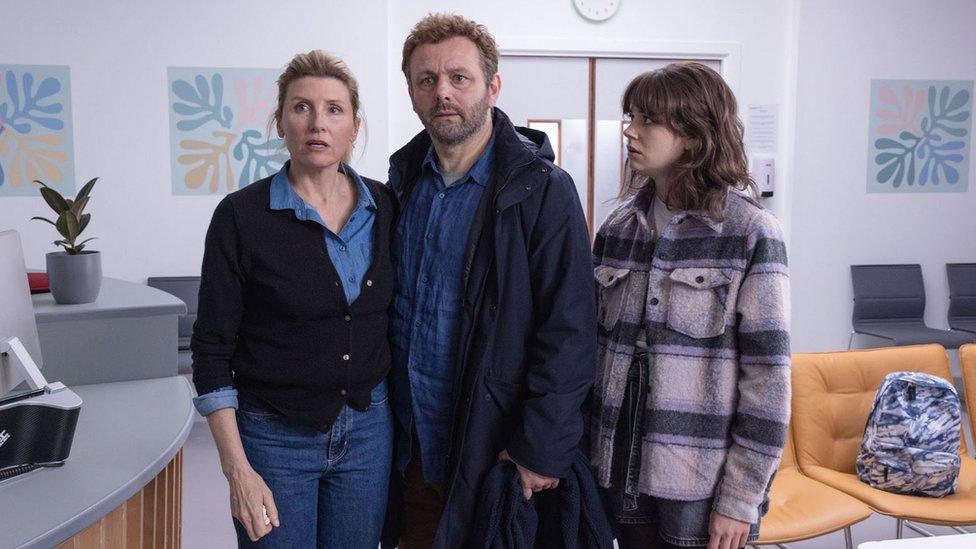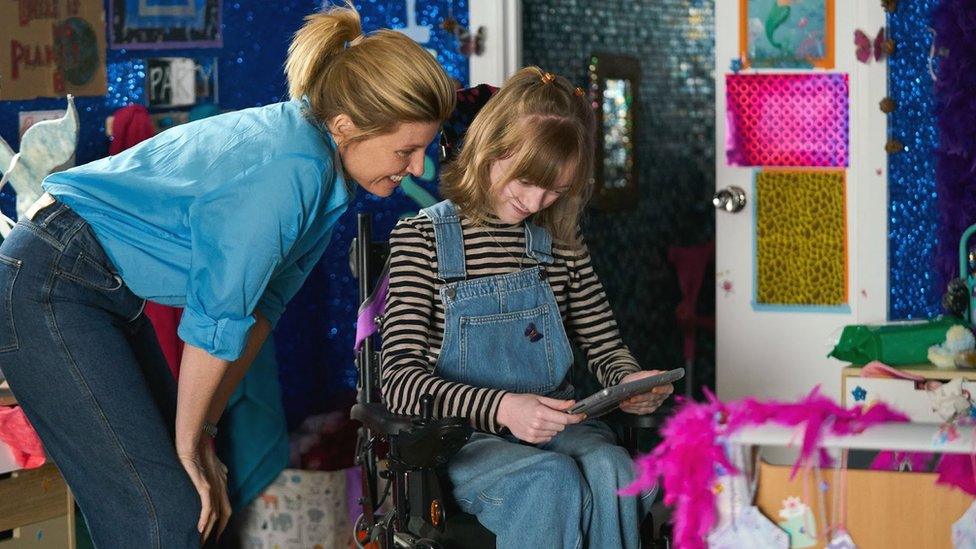BBC drama asks: When do you let a sick child die?
- Published

Sharon Horgan and Niamh Moriarty in BBC One's Best Interests
How do you decide when to stop treating a sick child, knowing that it will end the child's life?
For Bafta-winning writer Jack Thorne, that's the central question in his latest TV show.
In the four-part BBC One series, Best Interests, parents Nicci and Andrew (played by Sharon Horgan and Michael Sheen) confront doctors who say it's in the best interests of their disabled child Marnie (played by Niamh Moriarty) to turn off her ventilator, allowing her to die.
"I wanted to tell this drama with complexity," Thorne says, explaining he tried to show the views from all sides of the debate - disabled people to parents and doctors - without "moralising".
"I hope I managed to steer a path through it," he adds.
Thorne, known for writing the stage play Harry Potter and the Cursed Child, the TV movie Help and the TV series His Dark Materials, says becoming a father three years ago brought the central question in the series home "hugely".
"I don't think I could have written this without being a parent," he says, describing the "fierce love" that comes with being a father.

Bafta-winning writer Jack Thorne says he wanted to tell this story with 'complexity'
But he says he has also come to understand the potential divisions that can arise between parents.
In the series, Marnie's parents are split on whether to agree with doctors to stop her treatment, setting up a legal battle that sees them take opposing sides.
"Being a parent with someone is a very, very, severe sort of intimacy," Thorne says. "You're constantly negotiating.
"That question of who has the child's best interests, and how you can decide what the child's best interests are, hopefully that permeates the whole show."
Hear more from Jack on the BBC's Access All podcast
In England and Wales the concept of parental responsibility is set out in the Children Act 1989, giving parents the responsibility broadly to decide what happens to their child, including the right to consent to medical treatment. But this right is not absolute.
If a public body considers that a parents' choices are not in the best interests of their child, and an agreement cannot be reached, it can challenge these choices by going to court.
A representative is appointed for the child - separate from their parents and doctors - and a judge makes the final decision, based on the evidence available.
The Department of Health and Social Care has commissioned an independent review of the disagreements that can arise between families and healthcare teams in the care of critically ill children in England. It is due to be completed by October 2023.
Best Interests also touches on the health inequalities in society experienced by disabled people - and what Thorne refers to as the "scars" caused by the pandemic.
He says friends of his were told they wouldn't get care during the pandemic because they were too ill.
"It's when we're in crisis that we show our true selves, and I think our society showed itself to be dangerously ableist."
Ableism is defined as discrimination that favours non-disabled people above disabled people.
Thorne adds: "I hope it's clear from the drama that I feel like the treatment of disabled people, particularly through the pandemic, was wrong and inhumane at times.
"But I also don't want to castigate NHS doctors and nurses who are all working hard or who have their beliefs."

Sharon Horgan and Michael Sheen (left and centre) star as Marnie's parents in Best Interests, while Alison Oliver (right) plays her sister
In Best Interests, Thorne says he was also keen to include scenes of laughter, love and even sex.
"That, in my opinion, is how these things work," he says. "When you're going through a tragic experience, it can be funny, it can be silly, it can be all these different things.
"Humanity pokes up in all sorts of weird places."
Writing is soothing
Speaking at the MacTaggart Lecture at the Edinburgh TV Festival in 2021, Thorne talked about having cholinergic urticaria, a condition that caused him to be allergic to artificial heat and movement, leaving him with welts and in pain.
When he was 20, he spent six months in bed and he says his life was very restricted for 10 years.
In the speech, he was also harshly critical of the TV industry, saying it had "utterly and totally" failed disabled people.
But Thorne says things have "moved on markedly" since he gave the speech.
"I'm very excited that disabled people are starting to move into leadership positions."

In Best Interests, Jack says he was also keen to include scenes of laughter and love
Thorne is also getting used to life after a recent autism diagnosis, something that came about after an appearance on radio programme Desert Island Discs, when a listener wrote to his agent suggesting he might be autistic.
The diagnosis made a lot of sense, he says. "I think it's been a positive."
Looking back, Thorne says being autistic helped with his writing career - and he says writing is still the one thing that he finds calming above all else.
"That has been my saving grace really through my life, the ability to be able to write and find comfort in creating situations where I can understand [things] better.
"I just find writing very soothing."
Sources of support are available via the BBC Action Line.
Watch Best Interests on BBC One and BBC iPlayer from 21:00 BST, Monday 12 June
BBC images courtesy: Chapter One/Mark Johnson /Kevin Baker